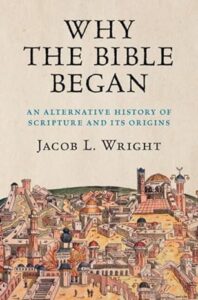WRIGHT J. L. Why the Bible Began: An Alternative History of Scripture and Its Origins. Cambridge: Cambridge University Press, 2023, 500 p. – ISBN 978110849093.
Por que nenhuma outra sociedade antiga produziu algo como a Bíblia? Parece improvável que uma comunidade minúscula e isolada pudesse ter criado um corpus literário tão determinante para os povos de todo o mundo.
literário tão determinante para os povos de todo o mundo.
Para Jacob Wright a Bíblia não é apenas um testemunho de sobrevivência, mas também uma conquista sem paralelo na história humana. Forjada após a devastação de Jerusalém pela Babilônia, não faz da vitória, mas da humilhação total o fundamento de uma nova ideia de pertença. Lamentando a destruição da sua terra natal, os escribas que compuseram a Bíblia imaginaram um passado cheio de promessas, enquanto refletiam profundamente sobre o fracasso abjeto. Mais do que apenas escrituras religiosas, a Bíblia começou como um projeto pioneiro para uma nova forma de comunidade política.
A sua resposta à catástrofe oferece uma mensagem poderosa de esperança e restauração que é única no antigo Oriente Médio e no mundo greco-romano. A Bíblia é, portanto, um roteiro social, político e até econômico – um roteiro que permitiu a uma pequena e obscura comunidade, localizada na periferia das principais civilizações e impérios, não apenas regressar do abismo, mas, em última análise, moldar o destino do mundo.
A Bíblia fala, em última análise, de ser um povo unido mas diverso, e as suas páginas apresentam um manual de estratégias pragmáticas de sobrevivência para comunidades que enfrentam o colapso social.
Why did no other ancient society produce something like the Bible? That a tiny, out of the way community could have created a literary corpus so determinative for peoples across the globe seems improbable.
For Jacob Wright, the Bible is not only a testimony of survival, but also an unparalleled achievement in human history. Forged after Babylon’s devastation of Jerusalem, it makes not victory but total humiliation the foundation of a new idea of belonging. Lamenting the destruction of their homeland, scribes who composed the Bible imagined a promise-filled past while reflecting deeply on abject failure. More than just religious scripture, the Bible began as a trailblazing blueprint for a new form of political community.
 Its response to catastrophe offers a powerful message of hope and restoration that is unique in the Ancient Near Eastern and Greco-Roman worlds. Wright’s Bible is thus a social, political, and even economic roadmap – one that enabled a small and obscure community located on the periphery of leading civilizations and empires not just to come back from the brink, but ultimately to shape the world’s destiny.
Its response to catastrophe offers a powerful message of hope and restoration that is unique in the Ancient Near Eastern and Greco-Roman worlds. Wright’s Bible is thus a social, political, and even economic roadmap – one that enabled a small and obscure community located on the periphery of leading civilizations and empires not just to come back from the brink, but ultimately to shape the world’s destiny.
The Bible speaks ultimately of being a united yet diverse people, and its pages present a manual of pragmatic survival strategies for communities confronting societal collapse.
Jacob L. Wright is a professor of Hebrew Bible / Old Testament at Emory University. Before coming to Emory, he taught at the University of Heidelberg in Germany. As an American with a European education, he is widely known for his ability to blend a wide range of historical, religious, and geographical perspectives on the Bible. His writing and teaching are thoroughly interdisciplinary, demonstrating how the ideas of the Bible and other ancient writings bear directly on central problems that face our societies in modern times. He brings to his work first-hand acquaintance with archeological finds and primary sources from ancient Mesopotamia, Egypt, and Greece. Wright writes on an array of topics, ranging from social life in ancient Israel (feasting, war commemoration, urbicide, etc.) to the formation of biblical writings.